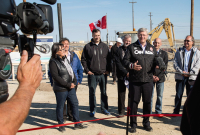Support strong Canadian climate journalism for 2025
Tony Clarke was a lifelong Canadian social justice and environmental activist who fought tirelessly to make the world a better place.
He was also my friend, mentor and my inspiration. I am blessed to have known this truly remarkable human being.
Among his many accomplishments, Clarke, along with Maude Barlow, was awarded the Right Livelihood Award — the alternative Nobel — in 2005 for exemplary and longstanding worldwide work for trade justice and the recognition of the fundamental human right to water.
On learning of his death, Right Livelihood’s executive director, Ole von Uexkull, said, “Tony Clarke’s relentless pursuit of justice and his unwavering commitment to safeguarding our planet’s resources have inspired countless individuals worldwide.
His legacy will continue to guide and motivate future generations in the fight for a more equitable and sustainable world.”
Growing up in Chilliwack, British Columbia, Clarke completed his academic studies with a PhD from the University of Chicago in 1974. After moving to Ottawa, he headed the social action department for the Canadian Conference of Catholic Bishops (CCCB). He represented the CCCB in the Working Group for Social Solidarity which began meeting in 1986 and produced the declaration A Time to Stand Together; A Time for Social Solidarity in November 1987.
He took a leave of absence from the CCCB and started the Action Canada Network to mobilize against the Canada-US Free Trade Agreement and later NAFTA. The bishops, increasingly uncomfortable with Clarke’s prominent activism, ultimately dismissed him, a move that liberated him to take on corporate and political power with no holds barred.
I have fond memories of travelling around Mexico with Clarke alongside our Mexican and US counterparts following the NAFTA trade negotiators. Lots of protests, lots of strategizing, lots of partying. They were heady times indeed.
At times discouraged about our struggles, Clarke’s relentless optimism reminded me of a line by Leonard Cohen: “There is a crack, a crack in everything. That’s how the light gets in.”
Clarke went on to play a key role in building opposition to the 1999 defeat of the Multilateral Agreement on Investment (MAI) . When Clarke died, tributes poured in from activists around the world who joined in the fight to defeat the agreement.
Clarke was a prolific author who wrote or co-authored a dozen books. After founding the Green Economy Network in 2009, a coalition of union and environmental groups that advocated for the creation of one million climate jobs, he wrote about the plan. The steps, more essential today than ever, are described at length in his last book, Getting to Zero: Canada Confronts Global Warming (2018).
Among his other publications are Blue Gold: The Battle Against Corporate Theft of the World’s Water (2002), which brought global attention to the commodification of water resources; Inside the Bottle: Exposing the Bottled Water Industry (2007); and Tar Sands Showdown: Canada and the New Politics of Oil in an Age of Climate Change (2008)
In 1997, Clarke founded the Polaris Institute, a water rights, energy and climate change think tank “dedicated to developing tools and strategies, notably to confront corporate power dominating public policy.” Polaris focused on trade policy and struggles both nationally and internationally.
I was on the Polaris board during its last years until it shut down in 2023. In closing, the Institute gave a donation to the Canadian Centre for Policy Alternatives to create an annual speakers’ series celebrating Clarke’s legacy. The first inaugural speaker event will take place in 2025.
Near the end of Clarke’s life, Joe Gunn, one of his closest friends, visited almost every Saturday to take him for walks. For Gunn, Clarke epitomized the archetypal passionate, joyful movement builder.
“Tony was so passionately committed to creating a better world, so open to including and encouraging more and more of us to meaningful activism — Tony’s inspired gift was that he managed to make all of us better.”
I visited Clarke from time to time during his final years while he was still at home, and later at the Elmsmere Villa Retirement Residence, living with dementia. While at home, we would stroll around the neighbourhood. Clarke used a walker. I did most of the talking, reliving memories and keeping him up to date on current events.
I last saw Clarke less than two weeks before he passed away. As usual, he recognized me. He rarely spoke, but as I was leaving, I said, “Tony I’ll be back soon.” He replied, “you’d better.”
Our deepest condolences to his wife Carol, his daughter Tanya, his son Chris; their partners and grandchildren. We mourn your loss.
Your struggle these last years is over. Rest in peace, Tony.
Tony Clarke died in Ottawa on Dec. 4. He was 80. A celebration of Tony’s life will be held on April 19 at 1:00 p.m. at the Beechwood Cemetery in Ottawa. All who knew him are welcome to attend.
Bruce Campbell is former Executive Director of the Canadian Centre for Policy Alternatives






Comments